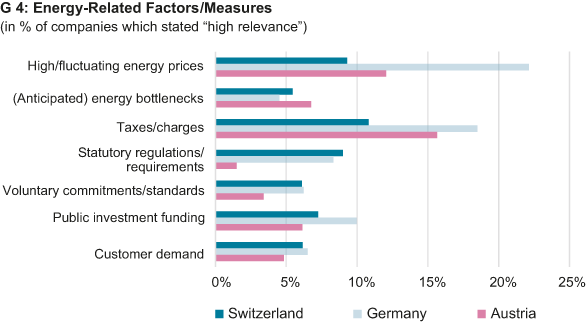The Impact of Political Measures on the Introduction of New Energy Technologies
- KOF Bulletin
- Energy
Why do companies decide in favour or against the application of new energy technologies? And which political measures are considered decisive by companies? These are the questions an international team of researchers investigated in the context of the national “Managing Energy Consumption” research project.
One of the key objectives of the Federal Council’s “Energy Strategy 2050” programme is the utilisation of existing energy efficiency potential, the size of which depends on the development of new technologies and their dissemination within an economy. Economic incentives to develop such technologies for other companies or to apply them in the own company do not always exist. In many cases, the risks associated with the technological success and development costs of such technologies are too high, the willingness to pay is lacking or the pay-off period is too long (see article in KOF Bulletin No. 102 of December 2016). These are some of the main reasons why energy policy measures are required to increase the use of environmentally-friendly energy technologies.
With the financial support of the Swiss National Fund and within the framework of the national “Managing Energy Consumption” research project (NFP 71), KOF joined forces with the Austrian Institute of Economic Research in Vienna (WIFO) and the Centre for European Economic Research in Mannheim (ZEW) to analyse and compare introduction patterns and technological activities as well as effective policies in Germany, Austria and Switzerland.
Political measures: energy taxes are key
The governments in Germany, Austria and Switzerland seek to achieve their environmental targets via political measures that promote the introduction and development of energy technologies. However, up until now, little information has been available regarding the extent to which companies consider such measures and other energy-related factors as decisive (see G 4).
Effectiveness of political measures
The creation of energy policy framework conditions is one matter – whether these conditions have a positive impact on the introduction of energy technologies is another. The survey data show that companies which place high relevance on taxes or voluntary agreements, public subsidies or demand for products/services manufactured with energy-efficient methods were more likely to introduce energy technologies in the period from 2012 to 2014.
In contrast, regulation does not show any effect. It is likely that most of the companies were meeting the regulatory requirements before the period under review and no further effects were obvious thereafter. This finding indicates the dynamic disadvantages of regulatory measures, which either do not adapt to new technological developments at all or do so with a significant delay. Not only does this slow down the introduction or demand for new technologies, it also leads to a lack of incentives to develop such technologies.
However, it should be noted that, with the exception of public subsidies, none of the political factors shows a significant correlation with the level of energy technology investment. This indicates that, although large parts of energy policies do have a positive impact on decisions to introduce energy technologies, the extent of the companies’ propensity to invest is not affected; other company-specific factors, such as the level of energy costs, are likely to be more relevant in this context.
Political measures promote development and marketing
Energy policy framework conditions mainly have positive effects when the measures promote demand for energy technologies or when they relate directly to the companies’ investment efforts – as is the case with public subsidies. Where this is not the case, individual political instruments, such as taxes/charges and regulation, may actually reduce innovation incentives. This negative impact is owing to the fact that taxes/charges and regulations primarily result in operating costs which can, for instance, be counteracted by the introduction of energy-efficient manufacturing processes. In this case, companies will lack the necessary funds for other investments, for instance the development and marketing of new energy technologies. This explains why individual policy measures may actually have a negative impact on the innovation performance of companies, especially if the additional costs are not juxtaposed with potential income from increased demand.
All in all, the preliminary results show that the current energy policy framework predominantly has a positive impact on the introduction of energy technologies. They also indicate that the assumed positive effect of political measures on the development of energy technologies only materialises when the policies stimulate demand for energy technologies. Otherwise, the cost effect predominates and the innovation propensity of the companies declines.
Information
The results of the project are based on a written survey of a representative sample of 5,789 Swiss, 6,374 German and 7,091 Austrian firms. The samples from the three countries were stratified according to company size and sector. The response rate was 31.4 per cent in Switzerland, 36.4 per cent in Germany and 7.6 per cent in Austria. The surveys were carried out at the same time in all three countries and on the basis of a uniform questionnaire.
The underlying Working Papers can be found here.
Contact
KOF Konjunkturforschungsstelle
Leonhardstrasse 21
8092
Zürich
Switzerland
